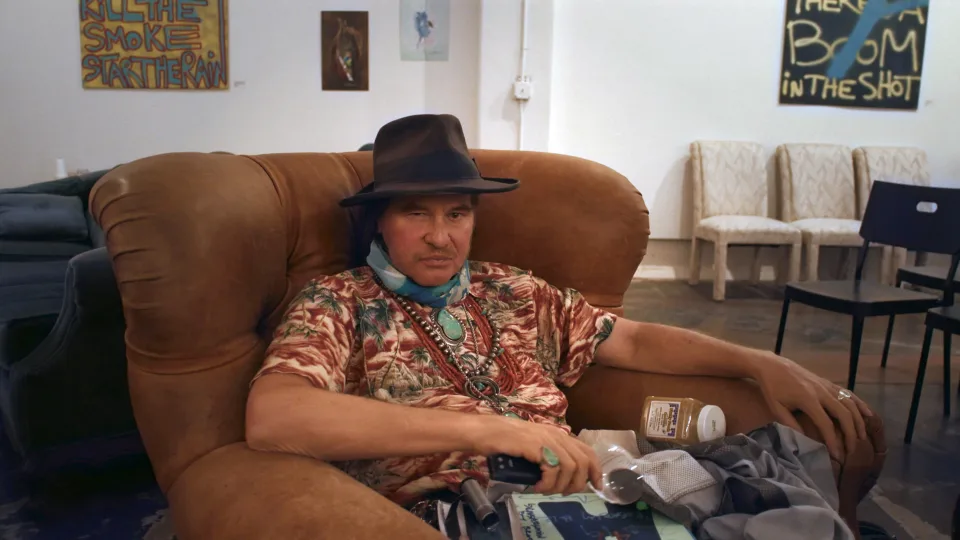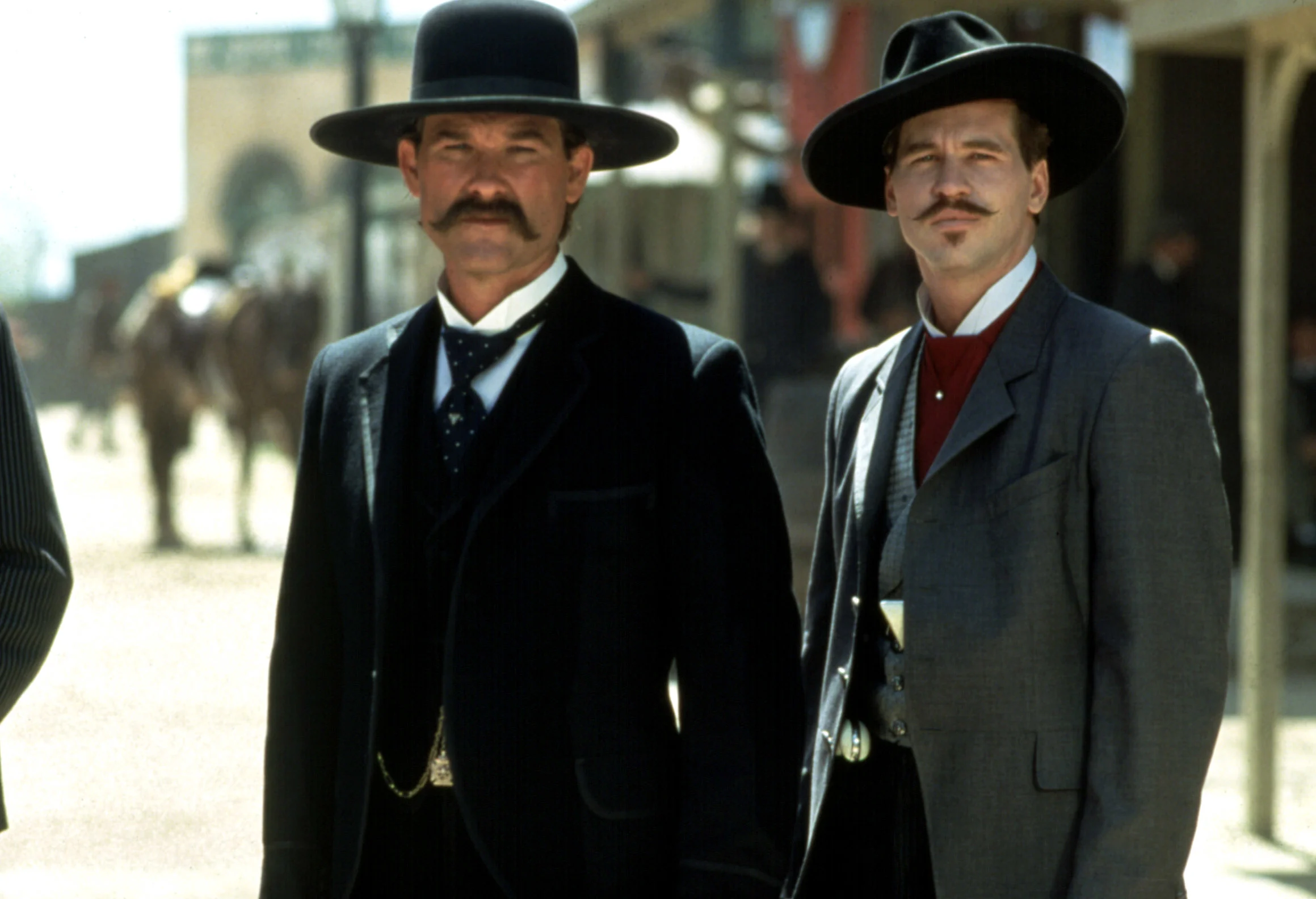Now playing on Amazon Prime, “Val” is a documentary that reveals an insider’s perspective of what it’s like to be a Hollywood actor. Like Oscar-winner “Amy,” archival footage is the secret sauce — in this case, shot by subject Val Kilmer himself and saved over the decades in a cavernous vault. Kilmer brought in editor Leo Scott a decade ago to digitize that footage. Several years later, Scott and another editor-director, Ting Poo, pitched Kilmer on turning his trove of material into a first-person documentary narrative about his so-called Hollywood life.
With any non-fiction film like this, getting access and keeping it is key to success. And yet the question when it comes to this sort of celebrity profile is always: How honest and authentic is the story? What has been left out? And, in the case of a film like “Val,” if the filmmakers work for the subject, can they craft a truly independent portrait? The answer, it seems, is no.
Kilmer’s career included some admired performances but he never became an A-list movie star. Some of his best work was in supporting performances (Iceman in “Top Gun,” Doc Holliday in “Tombstone,” a bank robber in “Heat”), and he was the lead in a lot of clunkers (“Red Planet,” “The Snowman,” “Thunderheart,” “Deja Vu”). Even with a superhero stint (“Batman Forever”), he never became a bonafide name above the title.
His best performance was probably Jim Morrison in Oliver Stone’s “The Doors” — one that even put the famously cantankerous director through the wringer. While Kilmer could be a fine actor, his strongest reputation was as a moody and difficult one. That’s significant, and it’s the piece of the equation that “Val” underserves.

Although Kilmer has been fighting throat cancer and has trouble speaking due to a tracheostomy, his words narrate the story using the voice of his son Jack. He talks about the ignominy of squeezing into a faceless rubber suit in “Batman Forever” to the insanity of starring with the obese and miserable Marlon Brando on “The Island of Doctor Moreau.” The filmmakers watched Stevan Riley’s 2015 “Listen to Me Marlon,” another movie that relies on the voice of its subject/narrator, gleaned from remastered audiocassettes.
“It was inspirational in that it was similar in its intimacy,” said Poo. “It reaffirmed that this type of thing could work and be powerful.”
In that case, Riley dealt with the late star’s estate, as did Asif Kapadia for “Amy” and and Amy Berg for “Janis: Little Girl Blue.” Estates are primarily vested in enhancing library values, and sometimes a little controversy can’t hurt. But if “The World Is a Little Blurry” enters the world of living pop star Billie Eilish and her family, R.J. Cutler isn’t going to throw a wrench into the ongoing promo push. The movie or series becomes one of many cogs in that machine, and the trick is to make it play as authentic and entertaining and inside as possible without giving away the hagiography inherent in the process.
The filmmakers focus on Kilmer’s only marriage, to his “Willow” costar Joanne Whalley, the mother of Jack and and his daughter Mercedes. They filmed Kilmer fussing over his scrapbooks, using the pages as chapter dividers. Scott and Poo do not gloss over the fact that their living, breathing subject has led a turbulent life, but crucial relationships with Ellen Barkin and Daryl Hannah aren’t even mentioned. There’s little discussion of Kilmer’s behavior; instead, it centers on the ways the studio system gives actors short shrift.
As Kilmer says in voiceover, “I have behaved poorly. I have behaved bravely, bizarrely to some. … I see myself as a sensitive, intelligent human being but with the soul of a clown.” That’s an admission, as far as it goes, but his demanding, often rude behavior on movie sets is well documented. “Batman Forever” director Joel Schumacher called him “psychotic,” costing him any possible sequels.
There were reports that while filming “The Island of Doctor Moreau,” Kilmer smashed a burning cigarette on a crew member’s face. (He denies any intentional wrongdoing.) Kilmer got so carried away during an emotionally charged audition for “The Doors” that he unexpectedly struck actress Caitlin O’Heaney in the face and knocked her to the ground. “When I got to the room and Val Kilmer picked me up and shaked me, throwing me down to the floor,” she told Buzzfeed, defying an NDA. “Stone just stood there the whole time laughing.”

The filmmakers don’t deny that they wanted to craft a friendly portrait. “That’s a result of the way that we have come to know him as a person,” said Poo. “We wanted to give people access to the kind of person that he is that they might not know, and give context for the things that have driven him as an actor and artist his entire life, to contextualize what people might think they know about him.”
Nor did they negotiate final cut on the movie. Clearly, Kilmer was in charge. “We had creative debates and differences,” said Scott. “Over the years, different projects we’ve worked on, we find a way. People think that we might have been barred from using anything, but we really weren’t. There was nothing that was off-limits, actually, in the footage. And he was open to us using anything. We were going on this journey together making this film.”
Did Kilmer want to direct it himself? In many ways, the film feels like his voice, his story, his movie.
“Well, it’s his life,” said Scott. “We deliberately wanted to tell this first-person thing, which meant relying on having his involvement and actually needing him from time to time to respond to scenes we had put together. We wanted to change the perspective. Most documentaries are a third-person perspective. But there’s nothing not valid about a first-person perspective. And it involved him having to come on the journey and to be part of that with us.”
The filmmakers had to work with a man who did not always give them what they asked for. “Sometimes we just want[ed] him to say a particular sound bite just to make sure that the scene makes sense or to connect two things,” said Scott. “And you prompt him to try and get that specific thing out of him. And he won’t give it to you exactly. He won’t give it to you exactly as you ask for without being too easy. And he’ll give it to you in a much more interesting way.”
“Val” launched at Cannes to strong reviews, and after a brief run in theaters, is on Amazon Prime, which will give the film an Oscar push. Many viewers are moved by the movie’s redemption arc. Some Academy documentary branch voters may not buy it.
